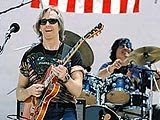My Writing Process, Part 3
Jingo has -- are you ready? -- one chord. One! Lyrically, it's almost as spare: it has three syllables. Not words, syllables! But even given this dearth of elements, it is an interesting song that draws you in and keeps you interested. How? The arrangement is clever and subtle, using diverse elements that build excitement and keep the song moving.
Songwriting Traps and Pitfalls
Having worked in the industry and around musicians for so many years, I'm pretty familiar with some of the pitfalls all songwriters face. To me, the most dangerous one is lack of self-evaluation.
Be Your Own Worst Critic
Look, songwriting can be learned and improved upon, just like any other skill. But in order to get better, you have to be willing to critique your own work. When I'm crafting a song, I'm constantly asking myself these questions:
- Is this part really needed? Is it adding to the whole, or just a diversion?
- Is each melody compelling? Does it make you want to hum along, and is it memorable? Or is it just an exercise in musical technique?
- Could this part be stronger? How?
When I started this project, one of the rules I had was: every song had to be worked out and played "live." I did that for several reasons:
1) How many times have you gone to see a band and been disappointed in their live sound as compared to their recorded sound? I didn't want our band to be guilty of that;
2) In the studio, it's easy to cover up a song's deficiencies by adding more tracks, thickening it with layers, etc. But live, you can't do any of that. If a part isn't working, you simply have to write a better part!
3) Having limited instruments makes you focus on the melody more. Why? Because if you only have one instrument to play the melody, or if two instruments play the melody and only the bass player is carrying the harmony, the melody better be pretty damn strong!
Having these limitations forced me -- as a songwriter -- to write competent melodies that stood on their own. Or keep trying until I did!



No comments:
Post a Comment